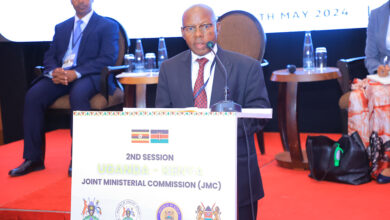HealthLocal News
Hospital under fire after mother of five dies following childbirth in Luwero
Hospital under fire after mother of five dies following childbirth in Luwero

A mother of five allegedly died at Luwero General Hospital after childbirth, sparking allegations of medical negligence and raising concerns about Uganda’s maternal healthcare system.
The grieving husband, Daniel Nsubuga, claims the hospital failed to conduct due diligence before inducing labor and lacked an emergency response system, ultimately costing 36-year-old Allen Navubya her life.
“She called me with so much excitement and said, ‘We have a baby girl!’ I was overjoyed. I told her I was coming to see them,” Nsubuga recounted. However, within an hour, the situation took a tragic turn.
‘No blood, no ambulance’
Navubya, from Kigulu Village in Wobulenzi Town Council, was initially referred to Luwero General Hospital after experiencing severe abdominal pain at a local clinic on March 14.
Despite being two months away from her due date, doctors decided to induce labor, and she successfully delivered a baby girl at 7:00PM.
Shortly after delivery, she began hemorrhaging heavily. Medical staff struggled to control the bleeding, eventually stabilizing her, but she required a blood transfusion to survive.
Nsubuga says he was shocked to discover that the hospital had no blood in stock and had not even tested his wife’s blood type in advance.
“I heard them making desperate calls to different places, but they couldn’t get blood. Worse still, they hadn’t even tested to know her blood group early enough,” he told Monitor on Tuesday.
The hospital sent him to a private laboratory for blood testing, which revealed she was B+, but by then, she had already lost significant amounts of blood.
In a last attempt to save her life, Nsubuga reached out to Bishop Caesar Asili Hospital, a private facility just 500 meters away, to secure blood.
However, Luwero General Hospital had no ambulance available for an immediate transfer.
“I kept asking myself, why did they induce labor without being fully prepared? Why didn’t they ensure blood was available first? Why didn’t they have an ambulance on standby?” Nsubuga questioned.
By the time an emergency transfer was arranged, Navubya’s condition had worsened. She died on arrival at Lacor Hospital, leaving behind her husband and five children, including her premature newborn, who is now receiving specialized care at Kiwoko Hospital.
Hospital acknowledges challenges
Dr Bruno Oyik, Medical Superintendent at Luwero General Hospital, expressed condolences and confirmed that an internal investigation is underway.
“We have launched a maternal death audit to assess what happened, what was done, and what was not done. This will help us understand the factors that contributed to her passing,” Dr Oyik told Monitor.
He admitted that blood shortages are a major challenge.
“The issue of inadequate blood supply remains a problem. Unfortunately, demand is higher than the supply we receive. We are working closely with the blood bank to improve the situation,” he added.
Uganda’s maternal health crisis
Navubya’s death highlights Uganda’s ongoing maternal health crisis. Despite improvements, the country’s maternal mortality ratio (MMR) remains at 189 per 100,000 live births, above the global average of 223 per 100,000.
The World Health Organization (WHO) aims to reduce the global MMR to below 70 per 100,000 by 2030, a target Uganda is striving to achieve.
Nsubuga expressed concern that “the tragedy has left him raising five children alone, including a premature infant.”
His hope is that his wife’s death will not be in vain and that authorities will take urgent action to improve maternal care and emergency preparedness.



